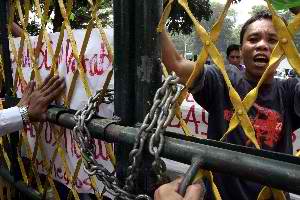By KAREN TUASON and RODOLFO DESUASIDO
TASK FORCE MAPALAD AND VERA FILES
(Conclusion)
THE land dispute between the powerful Teves clan of Negros Oriental and 30 farmer-beneficiaries has left two persons dead.
Arnaldo Hoyohoy, son of a farmer who holds a Certificate of Land Ownership Award (CLOA), was gunned down on Dec. 3, 2008 in front of his father’s house in Barangay Caranoche in Sta. Catalina town. Eleazar Casipong, a lawyer of the Department of Agrarian Reform in Bayawan City, was ambushed on Jan. 30, 2009 by two masked men riding in tandem on a motorcycle on a highway in Sibulan town.
The killings remain unresolved, but the farmer-beneficiaries say they are agrarian-related.
Hoyohoy had been acting on his aging father’s behalf and had been active in farmers’ issues. Casipong, on the other hand, had helped draft petitions, motions and pleadings of the farmers, who consider him a hero.
The killings are not the farmers’ only worries. Recently, they complained to the Department of Interior and Local Government that Arnie Teves, newly elected barangay captain of Malabugas in Bayawan City, had sent men armed with M-16 Armalite and AK-47 assault rifles to the disputed areas in Barangay Caranoche in Sta. Catalina town and Barangay Villareal in Bayawan City.
The farmers got CLOAs in 1999, but the Teves clan has stopped them from occupying the land. Resolution of the dispute appears nowhere in sight. Some officials of the DAR and the Department of Justice have thrown legal obstacles in the way of the beneficiaries.
In late 2006, the DAR provincial office issued an order to install the farmer-beneficiaries on the land after the Supreme Court junked with finality the claim of Herminio Teves, Arnie’s grandfather, over the land. The installation, however, could not push through because the property was secured by armed guards.
On March 12, 2007, then Regional Director Datu Yusoph Mama issued an order stopping the installation and disqualifying 15 of the 19 Caranoche farmer-beneficiaries. He based his decision on an Aug. 21, 2006 report of the Municipal Agrarian Reform Office (MARO) of Sta. Catalina recommending the disqualification of the 15 farmers.
The disqualified beneficiaries led by Francisco Cacas appealed, but Mama turned it down. Cacas and his group then turned to the DAR secretary for help.
On Sept. 22, 2007, Agrarian Reform Secretary Nasser Pangandaman set aside Mama’s March 12, 2007 order and recognized the legitimacy of the 15 beneficiaries.
The farmer-beneficiaries then pressed for immediate installation by camping out in front of the DAR central office in Quezon City. On March 1, 2008, Undersecretary Delfin Samson ordered the DAR regional and provincial offices to install the farmers.
Installation was scheduled on June 13 that year but three days before that, DAR regional officer Dominador Andres ordered a status quo and postponed the installation without giving any reason. This prompted the farmer-beneficiaries to hold protest actions and press for more dialogues with DAR.
A new installation was scheduled on Oct. 18, but again Pangandaman canceled it, saying the Philippine National Police had refused to comply with DAR’s request for assistance. The PNP, in turn, cited the absence of a final and executory decision on the inclusion-exclusion petition filed by farmers affiliated with the Teveses and the absence of a directive from the PNP chief for them to assist in the installation.
In late October, six farmer-beneficiaries from Villareal and Caranoche held a hunger strike in front of DAR central office.
On the morning of Nov. 6, the other Villareal farmer-beneficiaries entered and occupied their CARP-awarded land to protest the repeated cancellation of their installation. That night, bursts of gunfire were heard in the area. Police investigated the next morning but found only shoeprints and not a single empty shell.
Finally, on Nov. 12, 2008, DAR installed the farmer-beneficiaries on the land in Villareal and Caranoche.
But the legal battle goes on in a maze of motions and counter-motions filed by both sides.
The Villareal farmer-beneficiaries are facing charges of forcible entry for occupying the land on Nov. 6, 2008. Prosecutor Ernesto Valencia ruled that at the time of their occupation, DAR had not yet taken possession of the property and the farmers might have committed illegal entry.
Then Justice Secretary Raul Gonzales denied their appeal, and the case is now lodged at the Bayawan City regional trial court.
The 19 Caranoche farmer-beneficiaries also have a pending appeal before the Office of the President against a March 12, 2009 resolution issued by Pangandaman, who reversed his Sept. 22, 2008 decision affirming the legitimacy of the Caranoche farmer-beneficiaries and ordering their installation.
Even before Pangandaman reversed his own decision, the farmer-beneficiaries were being forcibly ejected from their CARP-awarded land. As soon as they were installed on Nov. 12, 2008, the farmers said they were constantly threatened and harassed by armed men who fired shots in the air and sometimes directly at their huts.
Pangandaman’s resolution had also emboldened Arnie Teves. On the day that the DAR secretary issued the resolution, which was still subject to a motion for reconsideration, Teves entered the property accompanied by security guards, policemen, the barangay captain of Caranoche and a group of pro-Teves farmers—and drove away all the farmer-beneficiaries, including the four who qualified.
Seeking their return to the land, the farmers have resumed their protest in front of the DAR central office in Quezon City.
Meanwhile, the new DAR secretary, Virgilio De los Reyes, has decided to reinstall the 11 Villareal farmer-beneficiaries. But he could not do the same for the 19 Caranoche beneficiaries because of their pending petition before the Office of President.
The farmer-beneficiaries remain in constant dialogue and consultation with DAR and have presented their case before the Commission on Human Rights and the Department of the Interior and Local Government.
The CHR is gathering affidavits from the farmers for a public inquiry. Interior and Local Government Secretary Jesse Robredo has called the attention of PNP Director General Raul Bacalso to the case. He has also asked the Negros Oriental police chief to look into complaints that Arnie’s men have been carrying M-16 Armalite and AK-47 assault rifles.
The farmer-beneficiaries have also petitioned Speaker Feliciano Belmonte Jr. to remove Arnie’s brother, Rep. Pryde Henry Teves, from his position as chairperson of the House Committee on Agrarian Reform.
Belmonte has expressed surprise over Pryde Henry’s involvement in the case. “I didn’t know that he was involved in this case, I never read about that. He should have disclosed that when the committees were being formed,” he told the farmers and their supporters who met with him on Oct. 6.
Belmonte promised to look into the possibility of a committee swap for Pryde Henry. But he was later reported as saying it would be difficult to remove the Negros Oriental congressman from the committee.
“I just hope Henry can rise above the potential conflict of interest,” Belmonte was quoted by reporters as saying.
Reacting to the farmers’ petition, Rep. Pryde Henry Teves said, “This is a democratic country. Everybody has the right to (file a petition) just as the bishops have the right to question the RH (reproductive health) bill.”
He said, however, that it’s not really civil society that is seeking his removal from the agrarian reform committee. “It is this organization—the Task Force Mapalad—that is active in wanting my ouster, and a few bishops who are involved in it,” he said.
Pryde Henry described the CARP coverage of the property as having become a “non-issue.”
“It has already been decided by the Supreme Court. There are only two issues left now—the rightful beneficiaries and the land valuation. Those are the only two things in question,” he said.
Rep. Teodoro Brawner Baguilat Jr. (Lone District, Ifugao) has filed a resolution calling for an inquiry into the status of CARP implementation in Negros Oriental, with focus on the Teves land case. The resolution enjoins the House agrarian reform committee to conduct the investigation. The farmers said they would make sure that Pryde Henry inhibits himself.
Meanwhile, 22 years after the case began, the farmer-beneficiaries have grown old. Some of them have died, bequeathing the land titles and the difficult struggle to their children. Many of those surviving have yet to enjoy the benefits of their land since receiving their CLOA.
Victoriano Cordero, 62, a farmer-beneficiary of Barangay Villareal, said the farmers’ real estate tax payments are up-to-date, but it is the Teveses who continue to cultivate and benefit from the land which is now planted to sugarcane.
When Lorenzo Teves stopped managing the land after losing in the 1987 senatorial elections, Cordero and the other farmers started planting rice. They gave one-fifth of the harvest to Lorenzo’s son Daniel.
In 1988, when the Comprehensive Agrarian Reform Law was passed, Daniel himself encouraged the farmers to apply with the DAR to become beneficiaries. When the land was placed under CARP coverage, they stopped giving the share of the harvest to Daniel. They continued to plant rice until 2008 when Arnie drove them away.
“He (Arnie) just wanted to remove us from our land because he says it is his land. He once told the local bishop here during a dialogue that we can only have this land over his dead body,” said Cordero.
With Arnie’s recent victory in the barangay elections, farmers feel they have more reason to be concerned. They believe he is on his way to creating a strong presence in politics, specifically by aiming for the leadership of the Association of Barangay Captains.
Rolando Flores, president of the Villareal-Caranoche Farmers’ Association, said, “Being ABC president would be Arnie’s stepping stone for his political aspirations. He wants to be mayor of Bayawan City.”
This article is part of a VERA Files project on human rights reporting supported by the British Embassy and The Coca-Cola Export Corp.

